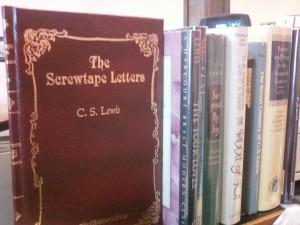At least, when it is done by someone else and the result is extra books!
It’s the time of year when folks are rearranging shelves. Maybe it’s an effort to stow away the holiday wrappings and decorations. More books have come in the front door in the last few days than in all of December. As a result of this afternoon’s purchases, I’m thinking we may have every C. S. Lewis title ever printed.
A couple of first editions among them.
To be honest, I didn’t know the author of the Narnia novels had penned so many books. When I’m overstocked (which is rare), his books get shelved in the literature section as well as religious reading – excepting the Chronicles, which are found in fiction, of course. Until this afternoon they had been reduced to – slim pickings.
I have learned that the Chronicles of Narnia weren’t the only fictional outings for the British author. In fact, there are plenty of titles on the table in front of me that I had never heard of before.
I’m really pleased to add the books to the shelves, but it saddens me somewhat that the fellow wanted to part with his collection. Moving, he said.
“Must be a C.S. Lewis fan,” I noted as I looked through the first box, stating what was perfectly obvious.
“I think I have them all,” he answered.
Looking over them, I’m thinking that may well be the case – as far as the non-fiction titles are concerned. So far I have only spotted a single Narnia-related volume.
The books could not have come in at a better time, though. When I took the first handful over to the literature section, I found only a single book. With the collection to be moved in next to it, I have to shuffle two entire sections of the literature titles. It’s for a good cause.
So, taking the time for this note is a break from the move-this-book-to-that-shelf, and this-bunch-to-the-next. It is nothing like ditch-digging, of course (I have done some of that in my lifetime) – but I don’t address those lower shelves like I once did.
With the shuffling completed I believe there is room to display them all, but I think I’ll leave the beautiful leather bound copy of The Screwtape Letters up in the front showcase. The gold-lettered spine and gilt front cover will fit in nicely with the first editions and fine-bindings.
A beautiful copy for someone’s library, and I can’t wait to find it a good home!
Come visit!
McHuston
Booksellers & Irish Bistro
Rose District
122 South Main St. Broken Arrow OK!


